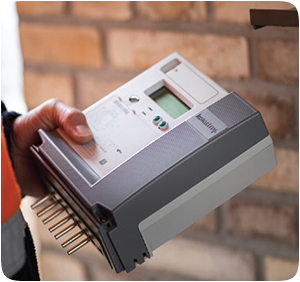 The reality in which power utilities operate today and the responsibility they are expected to assume in the future are changing rapidly. The keyword is having the flexibility to continuously make the investments that generate the most value.
The reality in which power utilities operate today and the responsibility they are expected to assume in the future are changing rapidly. The keyword is having the flexibility to continuously make the investments that generate the most value.
Within smart metering solutions for power utilities, openness has long been the answer. However, only recently has it become clear what the real question is. It's about how utilities can buy enough flexibility into their business to enable them to meet both their current and future business needs.
A NEW REALITY FOR UTILITIES
The path to this clear-sightedness has been paved by especially two market tendencies seen over the last few years. The first one is the consolidation challenge many utilities are facing today, where efficiency demands drive utility companies to merge only to find themselves struggling to operate efficiently in a morass of IT systems that must somehow magically co-exist.
The second is the current state of change of the power utility's role – which, from a political point of view, includes a key role in the green transition. Areas such as integration of renewables, balance responsibility and effect challenges are still so complex and undefined that for a utility to lock themselves in with a certain technology for the next decade is becoming increasingly unimaginable. According to a recent report, renewables are expected to make up 90% of the electricity mix in Europe by 2040, with wind and solar accounting for 80%. Without knowing even just five years down the road which regulation will apply, what demands utilities will have to meet and which technologies will surface or die out, why would they?
Instead, utilities need the flexibility to be able to gradually upgrade (or replace) their meters and to implement new technology in the lots, order and pace that deliver the most value.
NEXT STOP INTEROPERABILITY?
On the system level, CIM has become the de facto standard for integration between HES and MDM systems not just for Kamstrup but for everyone else as well. As a result, we see that in the systems that are installed today, the HES is, in practice, operated through the utility’s other business systems.
On the meter level, the industry hasn’t reached the same level of interoperability. DLMS is the widespread standard among meter suppliers, but it’s not Plug & Play, it always requires an integration effort and even then, a utility can only expect basis functionality based on the lowest common denominator. However, for the majority of utilities, being unable to boast 100% interoperability is not a problem if they are just smart about their investments.
MAKING SMARTER INVESTMENTS
Based on our experiences with customers, 20% of a utility's metering points may hold 80% of the potential in terms of supplying the detailed and frequent data necessary to gain deeper grid insight and optimise operations. Hence, this is where technology is needed most, while daily billing data will often suffice from the rest. A utility about to invest in a new system should, therefore, focus on upgrading that 20%, while the value of upgrading the remaining meters can be assessed if and when the need arises.
This, of course, makes demands on the supplier of their business critical meters, meter reading system and data analytics to not only provide the necessary flexibility to handle other meters as well but also cooperate in the necessary partnerships to continuously ensure better utilisation of data in an uncertain future.
Ultimately, there is no longer any doubt that openness is the way forward for utilities. But how they use it, will determine how fast they will go.
For further information, please visit the website at: www.kamstrup.com